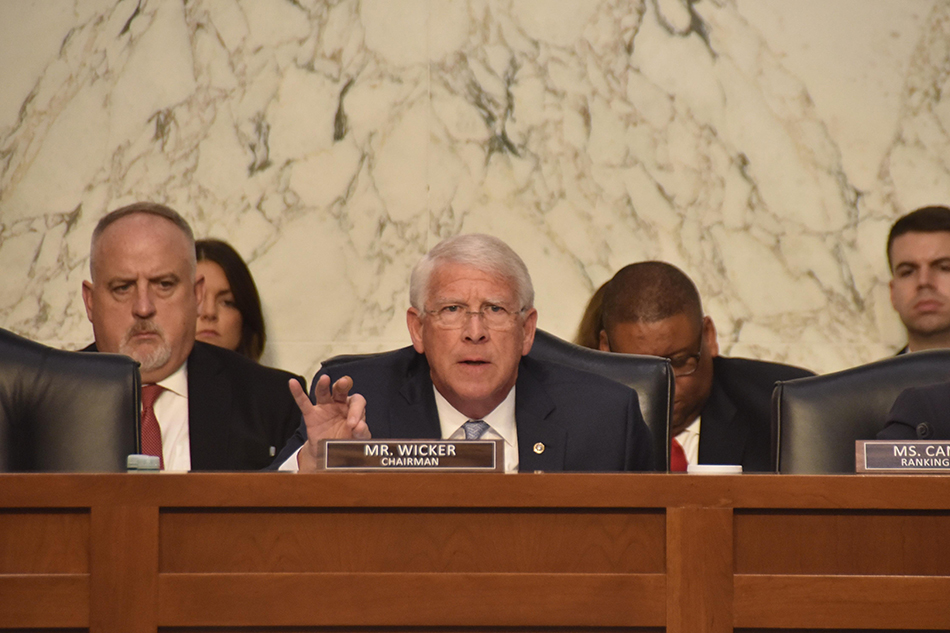Sen. Wicker Pitches STELAR Renewal on Senate Floor

The smarter way to stay on top of the multichannel video marketplace. Sign up below.
You are now subscribed
Your newsletter sign-up was successful
Sen. Roger Wicker (R-Miss.) took to the Senate floor to implore his colleagues to pass an extension of the STELAR compulsory license/good faith negotiation law.
He warned of the viewers who would lose access to distant network signals if the law were allowed to sunset.
It expires at the end of the year unless reauthorized or that deadline date extended.
House E&C Schedules STAR Markup
Wicker has proposed a simple five-year reauthorization, STAR or Satellite Television Act Reauthorization, but pulled it from a markup last week, likely because he did not have the votes to pass it out of the Senate Commerce Committee, of which he is chair.
There are at least two bills in the House, both with added reforms that could make it tough to reconcile with a Senate bill.
Following is a transcript of Wicker's floor statement, as supplied by his office:
The smarter way to stay on top of the multichannel video marketplace. Sign up below.
"Madam President, I rise today because there is a legislative deadline in front of this body that we dare not miss. Even as I speak, our colleagues in the House Energy and Commerce Committee are considering the Satellite Television Extension and Localism Act Reauthorization – or STELAR.
"For 30 years, STELAR and previous versions of the law have allowed people who live beyond the reach of a broadcast signal to receive broadcast programming nonetheless.
"Some Senators believe that in 2019 STELAR has outlived its usefulness and want it to expire. But other Senators want to extend some of these provisions – at least in the short term – to prevent consumers from losing these broadcast signals. Still others want to use the STELAR reauthorization legislation as a vehicle to implement other reforms.
"I have introduced new legislation, the Satellite Television Access Reauthorization – or STAR – to move this process forward. The existing STELAR statute expires December 31st.
"So absent congressional action before the end of the year, the provisions included in STELAR that enable nearly 870,000 Americans to access broadcast TV signals will no longer be the law of the land.
"These Americans, who depend on STELAR, are mostly in rural parts of this country, like my home state of Mississippi. They include truckers, tailgaters, and RV drivers. And they include Americans living in very remote areas.
"I say to my colleagues, now is the time for Senators to make their positions clear. Over the course of this year, I have been polling Members to ascertain what this body wants. As Chairman of the Senate Commerce Committee, I will act according to the majority wishes. But time is running short.
"Many people point to the fact that the media landscape is changing. There are more options for video content than ever before. New programming is coming out every day that is being streamed through new services. Those are all great things. As I said at a June Commerce Committee hearing, we are living in the Golden Age of television.
"The Commerce Committee has been working to close the digital divide between rural and urban America to make sure all families can access those choices and all families can be part of the Golden Age. But, there are still Americans without internet access and without broadcast signals. They deserve the ability to view basic television services, just like everyone else.
"Without the reauthorization of STELAR, many Americans would not be able to watch broadcast news or enjoy access to programming that is available for the rest of the country. They will be on the wrong side of the digital divide, and there would be a widening cultural divide as they would be cut off from the flow of programs and information.
"If members of this body are of a mind to move forward with some extension of this statute, we will work with our colleagues in the House. That may include improvements and enhancements to STELAR that address good faith requirements, level the playing field in the marketplace, promote access to programming, and ensure robust competition. But we don’t have much time.
"After this week, senators will go home for Thanksgiving. Many of those across the country who benefit from STELAR in our states will watch football games and the Macy’s Thanksgiving Day Parade thanks to the STELAR law. They will enjoy time with their families, and I look forward to doing the same.
"But when Congress returns, there will be just two weeks – ten legislative days – to finalize any legislation and send it to the President for a signature.
"Madam President, in this body taking no action is easy, it comes naturally. But in this case no action equals the repeal of the STELAR law in its entirety and members should know that.
"We have ten days to ensure 870,000 Americans will be able to watch the same programs next year that they are seeing this year. Or we can let STELAR expire and take the risk of letting the chips fall where they may."
Contributing editor John Eggerton has been an editor and/or writer on media regulation, legislation and policy for over four decades, including covering the FCC, FTC, Congress, the major media trade associations, and the federal courts. In addition to Multichannel News and Broadcasting + Cable, his work has appeared in Radio World, TV Technology, TV Fax, This Week in Consumer Electronics, Variety and the Encyclopedia Britannica.

